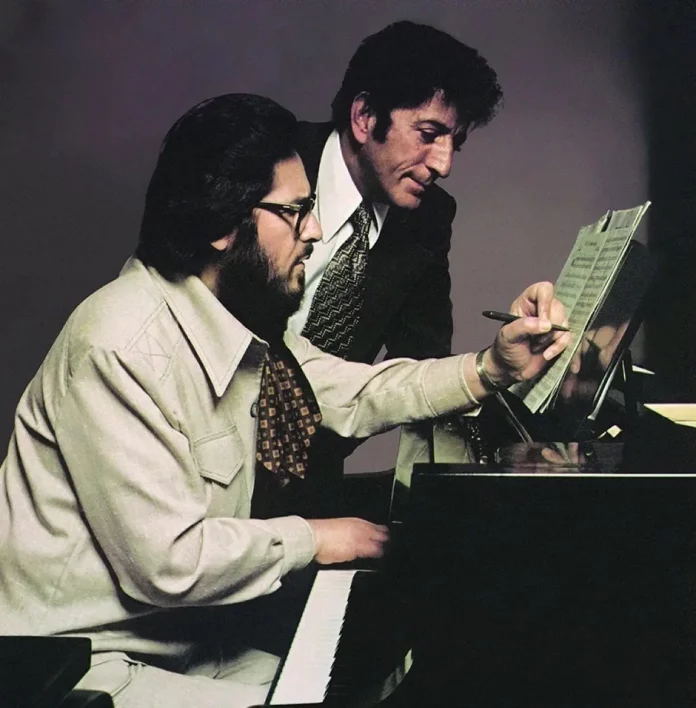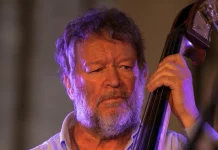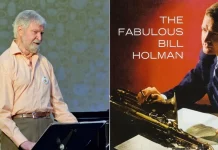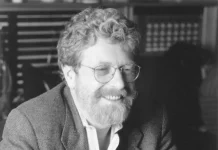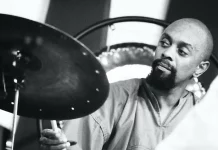Singer Tony Bennett died aged 96 at his home in Manhattan on 21 July. No causes were given for his death, but he had had Alzheimer’s disease since 2016. That year The Empire State Building was specially illuminated for his 90th birthday.
Bennett’s remarkable career lasted more than 70 years, and fell into two parts. His first best-selling recordings and concerts occurred in the 1950s. Subsequently, he had to deal with a drug problem and the arrival of Beatlemania, but re-emerged in the 80s and captured a younger audience as the star of MTV Unplugged, and the accompanying album won two Grammy Awards.
In the first phase, his hit records included I Left My Heart In San Francisco, The Good Life and the following year Who Can I Turn To? In 1962 he also gave an outstanding concert performance at Carnegie Hall. Asked if he ever tired of singing I Left My Heart, he responded “Do you ever get tired of making love?”
During his second coming, critic Francis Davis wrote in 1990 that Bennett had become “the best singer in the world. In addition to making a virtue of the slight huskiness that has crept into his voice with age, it gives his performances an autobiographical depth comparable to that which Sinatra achieved in his late prime.” In fact, Bennett and Sinatra formed a mutual admiration society. In 1965 Sinatra called Bennett “the best singer in the business”, adding “He excites me when I watch him. He moves me. He’s the singer who gets across what the composer has in mind, and probably a little more.” Bennett returned the compliment when he wrote in Vanity Fair “I like to think that what he heard in my singing was the same honesty that I, and millions of others, found in his.”
Best-known for his performances of mainly classic popular songs, Bennett was also a life-long jazz enthusiast, always involved with jazz instrumentalists and vocalists. Gary Giddins shrewdly observed that Bennett “is a pop singer who records extensively with jazz musicians but always comes off as a pop singer with a keen appreciation of jazz”. Music historian John Edward Hasse said that Bennett possessed “a jazz musician’s sense of phrasing and sense of timing, as well as a feeling for spontaneity”, adding “These are timeless aesthetic values that he personifies.” In 1974 Whitney Balliett contended that Bennett was “an elusive singer” who drives a ballad as intensely and intimately as Sinatra: “He can be a lilting, glancing jazz singer. He can be a low key, searching supper club performer, [his] voice binds all his vocal selves together.”
These comments are borne out by a consideration of some of Bennett’s more notable jazz recordings. In the late 1950s and early 60s, he sang along with Nat Adderley, the Count Basie orchestra (two lively albums, available in various formats and under various titles), Stan Getz, Art Blakey, Zoot Sims, Al Cohn, Milt Hinton, Elvin Jones, Chico Hamilton, Herbie Mann, Ron Carter and his long-serving pianist and advisor Ralph Sharon. These can be found on an excellent CD compilation, Tony Bennett/Jazz (Columbia CGK40424). In 1962 he gave an outstanding concert performance at Carnegie Hall, made available on two Capitol LPs. He also performed with Ruby Braff, Tommy Flanagan, Harry Edison, Diana Krall, Kay Starr, B.B. King, Ray Charles and Stevie Wonder.
His most rewarding jazz partnership was with Bill Evans, with whom he made two seminal albums – The Tony Bennett / Bill Evans Album and Together Again (1975/1976). An admirer of Evans, Bennett called the pianist “a great, great musician, very eloquent, the ultimate in musical taste. He’d work for three or four hours on each song we did: we’d work out what tunes to do, the keys and tempos.” The results of their partnership were staggering. Evans proved an excellent accompanist – before taking off into flights of fancy while Bennett (not yet really a jazz singer) demonstrated his mastery of phrasing. In 1996 he recorded the album Bennett / Berlin, accompanied by three firm jazz friends: Ralph Sharon and Dexter Gordon (All Of My Life and White Christmas) and George Benson (Cheek To Cheek).
He was 64 when he featured as a cartoon version of himself in The Simpsons and 82 when he appeared in the HBO series Entourage. He won his first two Grammy awards for San Francisco in 1963, and his last for the album Love For Sale with Lady Gaga in 2022. Some estimates calculate that in total he sold more than 60 million records. In a news item on Love For Sale, Mark Gilbert quoted Gaga as saying “Jazz music is the greatest music that I believe exists in America. To me singing jazz with Tony Bennett is the highlight of my career.”
Anthony Dominick Benedetto was born 2 August 1926 in the neighbourhood of Queens, New York. His father, Giovanni, had emigrated from Calabria at the age of 11 and became “John”, a grocer. His mother Anna (Suraci) Benedetto was born in New York in 1899 and was a seamstress. The young Anthony recalled that his father “inspired my love for music”.
Bennett also became an accomplished artist. Among his achievements are the artwork for the cover of his first album with Bill Evans, and a portrait of Louis Armstrong that hangs in the Armstrong museum in Queens, New York.
On working part-time as an elevator operator, Bennett recalled “I couldn’t figure out how to get the elevator to stop at the right place. People ended up having to crawl out between floors.” He performed locally as a vocalist under the stage name Joe Bari, before serving in the army during World War II, fighting in the Battle of the Bulge and helping liberate a concentration camp at Landsberg. He described his wartime experiences as “a front row seat in hell”. In Germany he had met an old black friend from New York and joined him for Thanksgiving dinner. Reprimanded by his CO for associating with an African-American, he was transferred to another unit.
Returning to New York, he took singing lessons and appeared at the Paramount Theatre with Pearl Bailey. When Bob Hope visited the show, he heard Bennett and immediately offered him a job – on the condition that he changed his name to Tony Bennett. But although newly named, he had a less than happy time when he signed for Columbia Records in 1950 – largely because the philistine producer Mitch Miller wanted him to record what Bennett considered to be inferior material. (He did, however, get him his first hit in 1953 with the ballad Because Of You.)
A lifelong Democrat, Bennett campaigned for John F. Kennedy in 1960, supported the civil-rights protests of the 1960s and joined Martin Luther King Jr. on the 1965 march from Selma to Montgomery, Alabama. His marriage to Patricia Beech lasted from 1952 to 1971 and to Sandra Grant from 1971 to 1983. In 2007 he married Susan Crow after a long relationship. They supported arts education in schools and financed the Frank Sinatra School of the Arts, a public high school in Queens.
Bennett leaves two sons, Danny and Daegal, from his first marriage and two daughters, Joanna and Antonia, from his second as well as nine grandchildren. In 1992 he won a Grammy for his tribute to Sinatra, Perfectly Frank, a labour of love, featuring 24 of his “torch and saloon songs”. In 2014 he topped the Billboard digital jazz songs chart with Cheek To Cheek, an album of 15 classic songs done with pop singer Lady Gaga and including Anything Goes and I Won’t Dance – which had both singers at the top of their respective (and joint) games. Bennett, then 88, became the oldest performer ever to have a No.1 record. In August 2021, he gave two farewell concerts with Lady Gaga at Radio City Music Hall in Manhattan to mark his 95th birthday. He received the Kennedy Centre Honours award in 2005, and was named a Jazz Master by the National Endowment for the Arts in 2006. He also performed for Nelson Mandela during his state visit to England in 1996, at the White House for JFK and Bill Clinton and at Glastonbury in 1998.
Bennett once said that he liked “the funny things in life. Once, when I was singing Kurt Weill’s Lost In The Stars in the Hollywood Bowl with Basie’s band and Buddy Rich on drums a shooting star went falling through the sky right over my head and everyone was talking about it, and the next morning the phone rang and it was Ray Charles, who I had never met, calling from New York. He said: ‘Hey, Tony, how’d you do that man?’ and hung up.”
Gary Giddins suggests persuasively that what Bennett ‘s age “cost him in power and range he made up in economy and time, swinging with imperturbable ease enjoying one of the longest last laughs in show business history.” His autobiography The Good Life (1998) was co-written with Will Friedwald. Bennett told him “I wanted to sing the great songs that I felt really mattered to people.” He did – Big Time.
Tony Bennett spoke about jazz, racism, rock ’n’ roll and painting in a 2006 interview with Today magazine.

